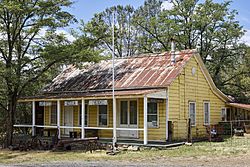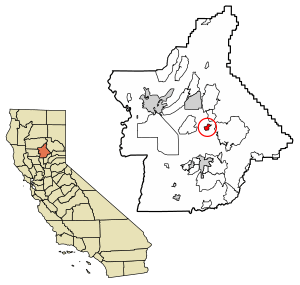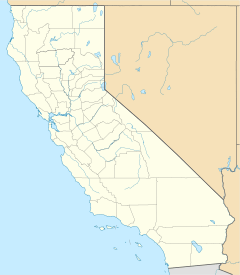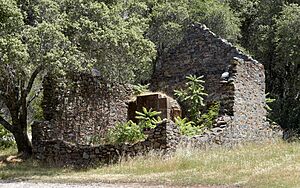Cherokee, California facts for kids
Quick facts for kids
Cherokee, California
|
|
|---|---|

The Cherokee Museum
|
|

Location of Cherokee in Butte County, California.
|
|
| Country | United States |
| State | California |
| County | Butte County |
| Area | |
| • Total | 1.922 sq mi (4.976 km2) |
| • Land | 1.751 sq mi (4.534 km2) |
| • Water | 0.171 sq mi (0.442 km2) 8.9% |
| Elevation | 1,306 ft (398 m) |
| Population
(2020)
|
|
| • Total | 88 |
| • Density | 45.79/sq mi (17.68/km2) |
| Time zone | UTC-8 (Pacific) |
| • Summer (DST) | UTC-7 (PDT) |
| ZIP code |
95965
|
| Area code | 530, 837 |
| GNIS feature IDs | 1655889, 2612476 |
Cherokee is a small community in Butte County, California. It's called an unincorporated community because it doesn't have its own local government like a city does. Before the California Gold Rush, Maidu Native Americans lived here. The area got its name from a group of Cherokee gold miners who found gold there.
In 2020, about 88 people lived in Cherokee. It sits at an elevation of 1,306 feet (398 meters) above sea level. You can find the town on Cherokee Road, just off State Route 70. Today, Cherokee has a museum, a cemetery, and a few homes. The Cherokee Heritage and Museum Association helps take care of these historic sites.
Contents
History of Cherokee, California
Early Days and Gold Discovery
The land where Cherokee is located was originally home to the Maidu people. Around 1818, Spanish explorers discovered gold on the south side of Cherokee, near Table Mountain. This discovery was a big deal!
In 1849, during the famous California Gold Rush, a group of Cherokee prospectors arrived from Oklahoma. They were skilled miners and helped develop the area. In the 1850s, miners from Wales also came to Cherokee. They built many of the town's buildings and helped it grow.
Mining Boom and Famous Visitors
Cherokee became a busy mining town. Even famous inventor Thomas Edison owned one of the mines here. He made sure the mines had electricity, which made the hard work a bit easier. Cherokee was quite advanced for its time; it had some of the first homes in Butte County with running water.
In 1880, some very important people visited Cherokee. These included President Rutherford B. Hayes, his wife Lucy, and Civil War General William T. Sherman. They came to see Cherokee's famous hydraulic mining operation. Hydraulic mining used powerful jets of water to wash away hillsides and find gold.
End of the Gold Rush Era
By the 1890s, the gold mines in Cherokee became too expensive to run. Because of these high costs, many mines were sold off. At its busiest, Cherokee had thousands of residents. A post office served the community from 1854 until 1912.
The Spring Valley Mine
Over time, many smaller mines joined together. By 1870, one large company, the Spring Valley Mining and Irrigation Company, ran most of Cherokee's hydraulic mining. This big mine eventually closed in 1894. Even today, you can find places named after it, like Spring Valley Elementary School and Spring Valley Reservoir.
Visiting Cherokee Today
Museums and Festivals
Many people visit Cherokee to explore its history. The Cherokee Museum teaches visitors about the town's past. There's also a historic cemetery that people can visit.
Cherokee hosts two fun festivals each year. One is on July 4th, celebrating Independence Day. The other is called President Hayes Day, held on a weekend close to September 24th, to remember the president's visit.
Nature and Scenery
Near Cherokee, you can find beautiful natural spots. Sugarloaf is a nearby hill where you might see deer, foxes, doves, and peacocks. It also has hiking trails for exploring. Table Mountain is famous for its amazing wildflowers that bloom in the springtime.
There's also an old Taoist temple built in the 1860s by the town's small Chinese community. It's one of the oldest Taoist buildings in America and is now a state historic site.
Education
Children in Cherokee attend schools in the Golden Feather Union Elementary School District and the Oroville Union High School District.
See also
 In Spanish: Cherokee (California) para niños
In Spanish: Cherokee (California) para niños
 | Dorothy Vaughan |
 | Charles Henry Turner |
 | Hildrus Poindexter |
 | Henry Cecil McBay |



